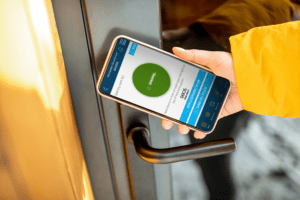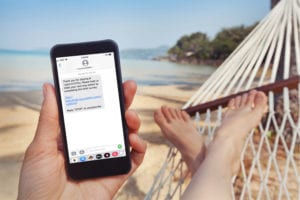Hotel messages to guests sent via email, SMS, or a mobile app should include welcome greetings, stay-related information, room upsells, and post-stay surveys. Great hotel guest communication is key to developing trust between travelers and your brand. Hotels that prioritize targeted communications over spray-and-pray messaging provide more value to their audience, earning subscribers’ trust and attention. Better audience engagement reduces a hotel’s reliance on OTAs to capture leads and makes each relationship more profitable thanks to happier, more loyal guests.
In this article, we’ll break down the types of automated and personalized hotel messages, plus provide real-world examples and advice to improve your communication approach. But first, we’ll cover the basics of sending hotel messages to guests.
Why You Should Diversify Your Hotel Guest Messaging
With the right guest messaging solution for hotels, you can contact guests via the digital channels they use most, such as email, SMS, and hotel mobile app push notifications. This generates a frictionless line of communication between a hotel and its guests.
Guest Messaging Tools for Hotels
The best way for a hotel to send messages to guests is by using marketing communication software that allows for email and text segmentation, automation, and personalization. Fuel’s Guest Messaging Solution is an easy-to-use software for hotels that segments guest lists and automates communications so people receive the right messaging at the right time. Be sure you’re following these hotel guest mobile messaging strategies for optimal results.
How To Personalize Hotel Messages for Guests
Tailoring communication, whether an automated message for a first-time guest or a post-stay email to a frequent visitor, is critical to a successful hotel messaging strategy. Personalized hotel messages are key to improving guest satisfaction by delivering relevant, timely information aligned with recipients’ booking journeys. Here are some personalization tips for sending customized hotel messages to guests:
- Include a field for the guest’s name and room type in the hotel check-in and check-out message template.
- Mention details of their upcoming stay, like the dates and travel purpose.
- Thank a guest for a recent stay, and include an offer for their next visit on a similar room type or encourage an upgraded experience.
- Invite non-members to join the loyalty program and include the point/reward earnings for their current or next stay.
- Provide exclusive offers based on the guest’s browsing habits and link to a booking or deals page.
- Invite guests to fill out a post-stay survey, referencing the stay dates, and link to the review page directly in the email.
When To Use Email vs. SMS vs. App Push Notification
Timing, message length, and guests’ preferences should determine when to use email, SMS, or app push notifications to communicate with subscribers. Email is best for longer messages that aren’t time-dependent, and SMS and push notifications are ideal for delivering short communications instantly, such as real-time service updates or limited deals. Hospitality properties should adopt multiple communication methods to tailor their communications to different audiences.
Here are some tips for using email, SMS, and push notifications for hotel guest messaging:
- Email: This cost-effective marketing channel offers a large reach for new customers and travelers early in the decision process, and people’s familiarity and comfort with newsletters bolsters high signup rates.
- SMS Text Messages: SMS supports a conversational, personalized tone that garners good engagement, and messages are often viewed instantly for more precise timing. Consider special offers or text-only deals to encourage guests to opt into SMS.
- Push Notifications: A hotel app’s built-in booking engine and planning tools can drive direct traffic, plus facilitate digital keys and contactless check-ins that incentivize guests to download the application.
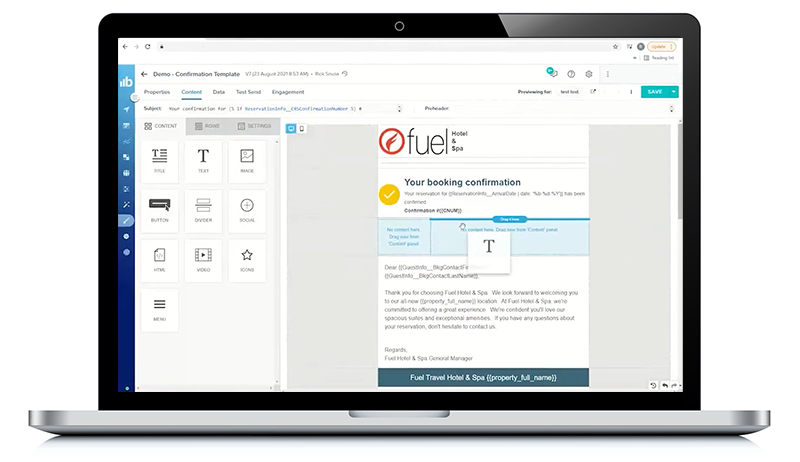
Now that we’ve covered the basics of hospitality messaging, let’s look at how to write various types of hotel messages and 16 examples you can send to guests during every step in the travel journey:
How To Write Relationship-Building Guest Messages
Early in the relationship, hotel messages must be helpful and keep the guest’s best interests at heart. This is not the time to be hard-selling customers on rooms, rates, or packages. Use these relationship-building messaging strategies to make positive first impressions.
1. Welcome Message at Signup
Every good relationship needs to begin on the right foot. When a potential guest chooses to provide their personal information, you need to start a conversation and set the tone for the relationship. The welcome message is often overlooked but it is one of the most important relationship-building tools for hotels.
The signup form for hotel messages should set guests’ expectations for future communications. The form should detail what you intend to communicate with guests and how often. It’s a good idea to reinforce these expectations within the welcome message and thank the recipient for providing their information and joining your email list. If you’re automating welcoming letters for repeat guests, you’ll want to personalize the emails with upsells or exclusive offers and introduce the loyalty/rewards program.
As with every message, the welcome email must include a call to action or a clear next step. Include a link to the hotel booking engine, a specific special offer, or informational content, such as the top 10 things people like about your property.
Learn more about writing impactful hotel welcome emails to make these messages count.
Example message: “Hi [guest name], thanks for signing up to the [hotel name] newsletter—you’re in for a treat! You’ll be the first to receive exclusive hotel offers and updates about [hotel name]! While you’re here, see what past guests have to say about [hotel name] [hyperlink].”
Expert Advice
This is an opportunity for you to sell potential guests on the value proposition by highlighting reasons people choose your property.
Convey the information clearly and succinctly so that it’s easy for the guest to digest in a fraction of a second. Some ideas to include are the property’s free breakfast, parking, or Wi-Fi, positive guest reviews, or information about the convenient location. The welcome message can also be an opportunity to encourage direct bookings by stating a lowest rate guarantee or displaying incentives for booking directly.
2. Information Requests
Relationships tend to get tighter as you learn more about each other. Your ability to serve the guest will also improve if you know more about someone’s habits and preferences. If a guest doesn’t return to your site or book within a couple of days of signing up, reaching out proactively to rekindle the conversation can be an effective communication method. A simple way to do this may be to send a personal message introducing the guest to the GM.
Here are some tips for writing information request messages to hotel guests:
- Write the message in the first person from the GM’s point of view so it sounds personal and friendly.
- Offer guests information about the manager and tell them about the property before asking for personal details.
- Explain to guests how their information can help you serve them better during their stay.
- Ask for their first and last name (if you don’t already have it), their zip code, and who they anticipate traveling with (solo, friends, partner, kids, etc.).
- You could inquire about the type of upcoming travel, such as business or leisure, specific events they are attending, their interests, and any special requests (there’s no question limit, but only ask for relevant information).
Example message: “Hi [guest name], my name is [GM], the general manager at [hotel name]. I’m delighted that you’ve considered [hotel name] as an option for your next trip to [hotel location]. I’d love to learn more about your travel plans so that we can better serve you. Please feel free to email me personally at [email address].”
Expert Advice
Avoid asking self-serving questions that will benefit you but not the guest. Ask for relevant information that will help your hotel be a better host.
How To Write Stay-Related Messages
Once someone has booked, the rules of engagement for hotel guest messaging fundamentally change. You can now capitalize on the fact that they are likely very excited about their trip and interested in your property’s amenities, policies, and location. Use these stay-related messages to demonstrate why your hotel is the right choice for a guest.
3. Confirmation Messages to Hotel Guests
While almost every property sends an automated reservation confirmation, very few take advantage of the high open rates of these messages. Confirmation emails are a direct line to a captive audience. A hotel’s message to the guest can provide valuable content to accomplish more than providing the itinerary, including:
- Encouraging email signups: An automated message for a first-time guest creates a prompt initial invitation to join the email list if they haven’t and check out the rewards program for their upcoming stay.
- Preventing buyer’s remorse: Reduce the risk of cancellations by using the confirmation message to reassure the guest that they made a great decision to book with you and that you’re excited about their arrival.
- Setting expectations for their stay: Include information on the typical weather conditions, nearby events, and previous guest reviews.
- Providing helpful check-in tips: Include check-in times, documentation requirements, and parking information, and invite guests to leave their luggage at the front desk while they enjoy the amenities before check-in.
Example message: “Thanks for choosing [hotel name]—you’ve made a great choice! Check out our FAQs below for check-in, parking, and additional hotel information. Before your visit, download our hotel mobile app [hyperlink] for express check-in, keyless room entry, and more.”
Expert Advice
Try to anticipate guests’ questions between booking and arrival. Speak with your reservation and front desk staff to formulate a list of questions they answer frequently. Provide answers within the confirmation email. Since you probably won’t answer every question a guest has, include contact information prominently within the hotel’s message to the guest so they may reach out.
If your property has a hotel mobile application, the confirmation email is a good opportunity to provide a link to it. Encourage guests to download the app to streamline check-in and get real-time room status updates.
4. Pre-Arrival Messages to Guests
The pre-arrival message to hotel guests is another opportunity to reiterate elements of the confirmation message and increase the guest’s anticipation for their visit. Depending on the duration between the booking and arrival, there may be opportunities to send multiple hotel messages to the guest. Remember to include content in each message to keep the guest engaged and offer valuable information.
If you’re primarily a drive-in destination, or if they live within a few hundred miles, you could include directions from their home to your property. You can include a commute time from your property to popular attractions nearby. You can also offer recommendations, such as your staff’s top picks for restaurants and shopping.
Example message: “We’re excited to see you soon—we’ve been counting down the days! Review our hotel FAQs [hyperlink] for important check-in and hotel policy information. If you haven’t yet, download our hotel mobile app [hyperlink] for express check-in. Please let us know if you have any questions.”
5. Day of Arrival Pre-Check-in Message
Anticipation and excitement for the stay is reaching fever pitch on the day of arrival but sometimes so are stress levels. Ease families traveling a long distance, people arriving for a big event, or any guest with a reassuring pre-check-in message. This message can share in their excitement, set expectations, and provide last-minute information.
- Reiterate the check-in process and offer a checklist of solutions to streamline the process, such as supplying required information online or opting for an express, keyless entry.
- Promote events on and off the property, showing you’re a knowledgeable resource on local happenings.
- Provide answers to frequently asked questions in a format that’s easy to reference.
- Supply the contact information of the on-duty manager and encourage them to reach out should they have any issues.
Example message: “We’re ready for your arrival! See [hotel name]’s arrival checklist below to ensure a smooth check-in process and download our hotel mobile app [hyperlink] for express check-in. If you have any special requests before your arrival, please let us know.”
Expert Advice
Use the hotel’s message to guests to request an approximate arrival time to help housekeeping schedule the room cleaning and allow staff to effectively plan resources.
6. Real-Time Service Updates via SMS
Sending hotel messages in real-time provides guests with essential information on their room status, amenity availability, or check-in details. This is ideal for guests who prefer contactless service or anyone looking for a customized experience. Guests can reply to SMS texts to engage in a two-way conversation with staff, asking questions and receiving personalized responses. A hotel can message guests at any point to provide periodic reminders on the hotel’s amenities or events, and booking confirmations for spa appointments or restaurant reservations.
Message example: “Hi [guest name], your room is ready now! Check in with the mobile app to receive your digital key or head to the front desk at your earliest convenience. If you have any special requests or questions, just ask.”
How To Write Hotel Room Upsell Messages
Once the guest has made their reservation, it’s time to send upsell messages to hotel guests to gain incremental revenue and improve their satisfaction. Use these upsell and resell messaging tactics to boost revenue.
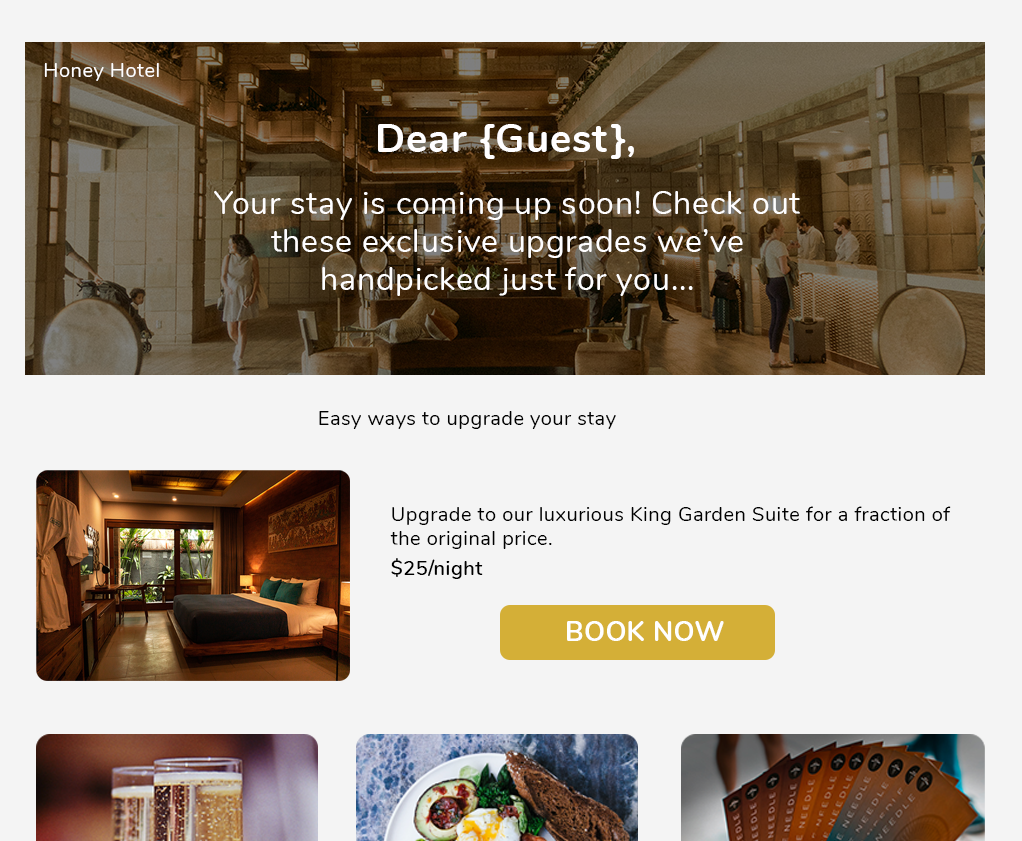
7. Hotel Upsell Messages for Pre-Check-In
Guests’ purse strings are typically at their loosest once their initial transaction is made. During the booking process, a guest may have wanted to stick to the ocean view room rather than splurging on the oceanfront room because doing so changed their total from $800 to $1000.
However, as their stay approaches, it may make sense for you to send an upsell message to offer an existing guest a nicer room to free up the lower-rate inventory. Economy rooms may be easier to sell closer to the date of stay, so your property may benefit by offering the guest an attractive proposition to upgrade.
Hotel guest messaging can feature more than room upgrades. Including offers for additional services or add-ons can also help generate incremental revenue and improve the guest’s stay. Many properties now offer upsell opportunities, such as wine or champagne in the room, breakfast, show tickets, and even early check-in or late check-out to entice guests to customize their stay.
Expert Advice
The upsell is sometimes combined with the pre-arrival message, but we recommend doing it as a stand-alone hotel message to guests and including some upsell opportunities in every pre-arrival message. Just be sure that the guests feel the value in what you’re offering and that the message doesn’t come across as price-gouging.
8. Pre-Check-Out Upsell Messages
Depending on the length of stay, you may want to give the guest the opportunity to extend the reservation by a night or two and/or offer a late check-out. Sending an upsell message to a hotel guest mid-stay can entice them to extend their reservation, providing the property with another night of occupancy. The pre-check-out hotel message can also be used to verify that the guest has had a satisfactory experience and correct any issues while you still can.
Example message: “We hope your stay has exceeded expectations. Looking to stay an extra night or two? Respond to this message or download our hotel mobile app [hyperlink] for stay extension options.”
9. Post-Stay Resell Messages to Hotel Guests
Though the primary objective of messages to past hotel guests is to earn a future reservation, they should always start by thanking the guests for their patronage. To make this a brand standard, include the language in the hotel check-out message template. When you send a message that is nothing more than an “ask,” it can seem one-sided and doesn’t nurture the relationship. Once you’ve established the tone, you can move on to business.
For all guests, it’s simply a good idea to encourage them to come and stay with you again. Personalize this automated message for a first-time guest or a returning visitor by showing them rates for the same room during similar dates the next year.
Example message: “Hi [guest name], thank you for choosing [hotel name] for your recent stay in [hotel location]. Next time, book through the official [hotel name] website to receive exclusive perks and extras like free valet parking and free bike rentals. See our latest best available rates [hyperlink].”
Expert Advice
A good friend and all-around smart guy, Tim Peter, always says that getting a guest through an OTA is fine but if they book with you through the OTA a second time, you’re doing it wrong. We couldn’t agree more. If you didn’t get the guest’s real contact information from the third-party channel, it’s worth it to put in some effort to collect this information. Once armed with a guest’s details, take advantage of it for hotel guest messaging focused on driving direct bookings. Start by explaining the benefits they get from booking directly, and consider offering them a discount for next time.
How To Write Hotel Survey Request Messages
Guest surveys are a great way for hotels to understand their performance and improve their services. If you’re not sending surveys to your guests, you’ll never learn about their experience. The ease of surveys via SMS messaging is a great way for hotels to increase positive online reviews. Use these survey and review messaging strategies to encourage feedback from your guests:
10. Mid-Stay Satisfaction Survey
Continue conversations from automated messages for first-time guests and check-in emails with a personalized message from the manager that arrives during the guests’ stay. Reiterate the importance of the guest’s comfort and satisfaction to help them feel valued. This may be an opportunity to send a short survey asking about the check-in process, the staff friendliness, and the room’s cleanliness.
Again, provide staff contact information in case there are any issues to help the guest feel comfortable reaching out. Also, proactively send hotel messages to any guest whose survey indicated a less-than-satisfactory experience to rectify the problem and prevent things from escalating.
Example message: “Hi [guest name], we hope your stay at [hotel name] has exceeded expectations. If there’s anything that you believe we could improve on, we’re ready to hear from you. Answer this short performance survey [hyperlink] and you’ll receive 10% off your entire meal at [hotel restaurant].”
11. Post-Stay Thank You/Survey
A survey is an excellent addition to a hotel’s check-out message template or as a standalone email. This should include sincere appreciation for the guest staying with you. Don’t jump straight into asking a bunch of questions about their stay.
A mistake many properties make is to send a lengthy survey that overwhelms the guest. Keep it as simple as possible with a yes/no answer to the question “Would you want to stay with us again in the future?” or “Would you recommend our property to a friend?” Depending on the guest’s responses, you can follow with additional prompts or a personalized hotel message.
For guests who indicate a problem, try to get more details and have someone reach out to the guest. For satisfied guests, see if you can get them to share the highlight of their stay with you. Tools like Flip.to make this really easy.
Another approach is to ask three simple questions:
- “What should we keep doing?”
- “What should we stop doing?”
- “What could we have done to improve your stay?”
The insights you will gain from these responses are far more valuable than what you’ll learn from a bunch of “Rate us from 1-10” responses.
Expert Advice
You should also use the post-stay thank you message to politely request the guest leave a review of the property on TripAdvisor and/or Google. Tell them why this is important and make it easy by providing a link and instructions.
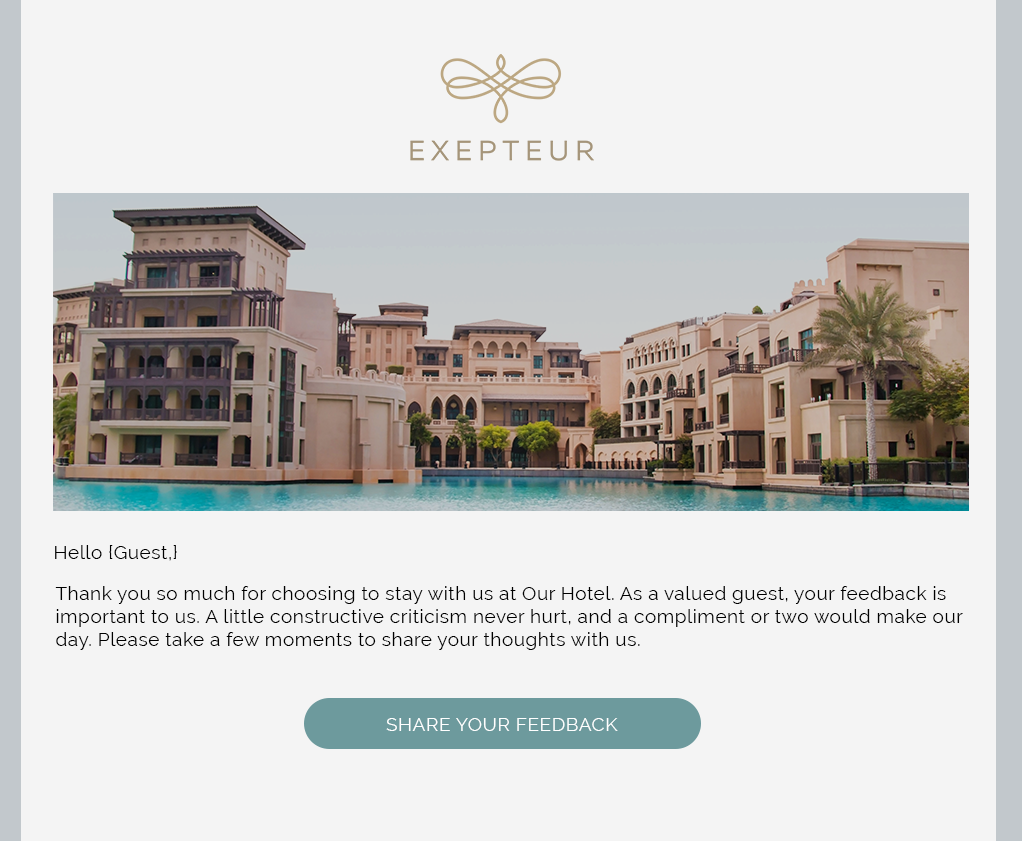
How To Write Revenue-Generating Hotel Guest Messages
If you’re tracking guests’ activity online (with the appropriate permissions), you have a massive opportunity to shift your communication strategy from demographic targeting to behavioral targeting. This methodology is more cost-effective and personalized, and the messages drive much higher engagement, which leads to more revenue and happier guests.
12. Post Website Visit Message
Rather than randomly sending generic messages to every subscriber, select which guests should receive specific hotel messages based on past browsing behaviors. Pay attention to when people come back into the shopping phase, and when someone you’re tracking returns, pay attention to what actions they take on your site. What dates are they searching for, and what content are they reading? Who is traveling with them? From there, you can tailor hotel guest messaging with content designed to help them with their booking decision.
In the case of Fuel’s Guest Messaging Solution, we use machine learning to determine what content will be most helpful for the guest and most likely to drive a conversion.
Example message: “Thanks for considering [hotel name] for your next stay in [hotel location]. Thinking of taking a fall trip with the family? Add our Fall Spectacular [hyperlink] offer to your stay, which includes free hot cocoa and s’mores by an open fire, and complimentary transportation to and from the best fall foliage spots in [hotel location].”
13. Cart Abandonment Message
This hotel guest messaging tactic is a no-brainer and should be one of the first triggers you implement. Be sure to personalize the message, making it easy for the recipient to resume their search by showing the rates and linking to the booking engine with their pre-selected dates and room.
This message should be used as a sales tool. Not only is it a way to sell the value proposition of your property versus the competition, but it’s also an opportunity to mitigate the risk of someone booking your property via a third party.
Example message: “Your room is still available for the dates [calendar dates]. Book through the official [hotel name] website today and enjoy late checkout and complimentary drinks at check-in!”
Expert Advice
Experiment with the timing and frequency of these hotel messages to guests based on the booking window and the length of stay. Dialing in the correct cadence is key to catching guests when they are most likely to book.
14. Birthday Messages to Subscribers
We all get bombarded with emails throughout the year, but we tend to pay more attention to the personalized deals sent to us as a birthday “gift.”
If you’ve collected data during your newsletter signup correctly, you’ll have access to every subscriber’s birthday. This gives you an automatic monthly segment for birthday messages. Mention their birthday in the subject line to catch the audience’s attention. Feeling recognized motivates the recipients to open the email and browse for exclusive offers. Personalizing these messages with the guest’s name or other details will make them feel special and valued, creating a deeper connection.
Example message: “Happy birthday [guest name]! We think you deserve a special birthday treat, so we have an exclusive offer just for you. Enjoy a special discount on your next stay at [hotel name] + a free meal at [hotel restaurant]. Slice of cake included!”
15. Event Notification Messages
If someone stayed at your hotel to see a specific band or attend a convention, message them the next time the event is scheduled for your area. You can also have some fun and build a deeper relationship with the guest if you make the content super-relevant to the subject matter. Include photos from the previous year’s event, or include carefully crafted language referencing the band, show, or convention.
Example message: “Your favorite band is heading back to [hotel location] for two nights! Last year, they rocked the roof off. This year, critics have described their tour as a ‘fist-pumping good time.’ Interested? Check room availability at [hotel name] for overnight accommodations [hyperlink].”
16. Anniversary of a Guest’s Booking
For our clients, anniversary hotel messages have been great revenue generators. These will likely also save you money on advertising because it helps you short-circuit the typical shopping and booking cycle and reduces the risk of someone booking a competitor or via an OTA.
If you collected the guest’s highlights or feedback from their previous stay, play to their sense of nostalgia and show their response to the previous visit front and center in this message. Also, focus on reducing friction by making it as easy as possible for the guest to rebook by showing rates for the same room and similar dates as last year, giving them multiple opportunities to jump into the booking process.
Also, highlight any new improvements or changes at the property to encourage them to come and experience the updates.
Example message: “You told us you loved [hotel name]’s pool features during your stay last year. We’re excited to announce we’ve extended our pool deck just in time for this year’s vacation season! Be the first to enjoy our new pool and amenity features by planning your next visit [hyperlink].”
More Hotel Guest Messaging Tips
- Make the messages personalized and friendly. It’s easy for automated messages to come across as sterile and generic. Try to use the guest’s name in correspondence and include details about their upcoming or past stay when possible. Add personality to your hotel messages by including photos of staff and guests, and writing conversationally from the GM’s (or another spokesperson’s) point of view.
- Revisit guest messaging software data. Stay in tune with who your subscribers are by reviewing the data captured by your messaging software. Look into the demographics to identify new booking trends and audience segments and create updated lists based on that intel.
- One size does not fit all. Always consider the source of the booking and create variants of each triggered message where it makes sense. Someone who books through an OTA should receive a different message than someone who books directly on your hotel’s website. Also, consider the length of stay and how far in advance the booking was made; these factors impact the message timing and frequency.
- Be selective with message types: Consider the guest’s preference and the message context when deciding between SMS, push notifications, or email. For example, a hotel’s SMS campaigns may be more effective while the guest is on property, but an email may be best to deliver longer-form content.
- Focus messages on the guests. To be successful, you must remember to operate with the guest’s best interest in mind, including when sending hotel messages. When you lose sight of what guests are looking for by subscribing and start sending surveys or content that only benefits the hotel, your campaigns will fail. Always ask permission and set expectations in advance of sending hotel messages to guests.
- Manage your subscriber lists. Remove people from generic, automated email lists when they are actively engaged in a personalized/triggered campaign. You want every message to be deliberate and focused on moving the relationship forward. Why confuse things by sending them a special when they’ve already booked?
- Test messages frequently. The benefit of automated messages for first-time guests, new subscribers, and birthdays is that once set up, they reduce the workload of your marketing team. But you should still prepare for the risk of triggered messages breaking at some point in the future. Periodically check hotel guest messaging and settings to ensure that the triggers are working, the content is relevant, and that guests are still receiving the best possible experience.
- Offer your guests the best deal, always. This is a non-negotiable rule in any service business. You may not always have the best price (OTAs can be tricky), but your “deal” should always be the best. This is not to say your daily rate will be the lowest (though it should). This does mean that the value a guest receives by booking directly is always top tier. A guest who books directly should enjoy exclusive perks, such as a free welcome gift, late check-out, free parking, or reduced resort fees. Think about your guests and always strive to make them glad they booked with you.
Automate and Improve Your Hotel’s Messages to Guests
The value of triggered communications, such as an automated message for a first-time guest, is that you’ll develop better relationships with your audience. You will move away from sending monthly or bi-weekly messages to your entire database to communicating with individual guests at a frequency that keeps them engaged. This nurturing approach strengthens loyalty and makes it easier for a hotel’s messages to offer upsells and experiences that lead to more enjoyable stays and happier guests.
If you want to implement these effective message triggers for your hotel, but don’t know where to begin, reach out to Fuel Travel. We offer the most advanced hotel guest messaging software available to take your campaigns to the next level.



